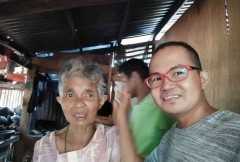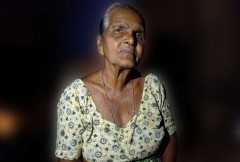

There are millions of Marcianas bringing up children of overseas workers in the true faith

My prayer book and rosary are my weapons in times of joy and sorrow, says Mary Hariyat a Catholic mother
As Maria Yuliana Farida carried the freshly harvested cocoa fruit in a basket into the backyard of her home, she murmured: “If one of these is damaged, we will have less to eat next week.”
The cocoa fruit harvested in the June-July season in Indonesia’s Catholic-majority Flores Island is part of her family’s weekly income.
“I believe that God, who we call in our language, Mori Kraeng, will always provide what we need. But of course, we also need to work hard,” 44-year-old Farida says with a smile.
She and her husband, Fransiskus Din, 47, work hard five days a week from morning till evening to feed their three children and bring them up in the faith.
While Saturdays is market day, the Catholic family spends Sundays as a day of rest and prayer dividing it between the parish church and home, Farida said.
Every Saturday morning, Farida and Din, walk one kilometer along the only pathway that connects their Wae Sano village to the outside world.Carrying the farm produce on their heads, the couple walks the narrow, potholed path to arrive at a road that leads to the traditional market in Werang, a sub-district town, 10 kilometers to the east from their village.

Farida at her home. (Photo: Ario Jempau)
Farida’s non-descript and isolated village, surrounded by hills and forests, is part of Indonesia’s Christian-dominated East Nusa Tenggara province.
Sundays “are like a small feast day,” as they take a break from the dawn-to-dusk farm work and start the day with Sunday Mass in the village, Farida said.
On Sunday mornings, Farida and her family walk to St Michael Parish Church, barely 100 meters from their house, dressed in their Sunday best.
“Going to meet God means that I wear a nice dress,” Farida said.
She, like most women in the area, wears a Manggaraian woven cloth called a songke, which is wrapped around the waist into a kind of a skirt.
“Clothes for Sunday Mass are different from everyday clothes. It's God's day, so we as a family will wear appropriate clothing,” she said.
Her parish has some 4,000 Catholics, who are part of Ruteng Diocese which includes three districts in West Flores- Manggarai, West Manggarai and East Manggarai.
Her parish church, built in 1916 and restored a decade ago, is amongst the oldest churches in the diocese. The church, which can accommodate some 700 people, is always packed to capacity on Sundays, Farida said.

Farida is working at the field to grow vegetables. (Photo: Ario Jempau)
“Tents are set up to accommodate more people on feast days such as Christmas and Easter,” she said.
Her Sunday prayers always revolve around her farm and her family.
“I also always pray that what I plant in the fields can provide for our family's needs. I also pray that we stay healthy. That's all,” she said.
Sunday also means an opportunity for Farida to mingle with her friends and relax. The young people in the parish engage in sports such as soccer and volleyball after Mass.
Inherited faith
Farida was born a Catholic. She is a third-generation Catholic in West Flores. Her grandparents were among the first five families baptized by Jesuit Father Henrikus Looijmans in 1912.
The Catholic faith came to the area late considering that Catholic missionaries arrived in Indonesia in the 16th century when Portuguese traders first appeared.
Farida said she passes the faith to her children just as she received it from her parents.

Farida with her grandson. (Photo: Ario Jempau)
“I don’t really know much about the Church teachings and dogma. What I do is invite them to pray and believe that God loves us all and He provides what we need,” she said.
Farida said she keeps reminding her children to attend catechism class, Sunday Mass and to get involved in all parish activities.
“We often pray together whenever we want to start certain activities. Before eating, for example, we make the sign of the cross, expressing our gratitude to God for the food,” she said.
She said their faith life was also influenced by the faith practices of parishioners and local Catholics. For example, every May and October, considered the months of Mother Mary, Catholics divide into groups and visit each house to pray the rosary together.
During Advent and Lent, parishioners participate in catechetical activities, organized by the dioceses throughout its parishes
“It really helps us to deepen our faith,” Farida said.

Farida's mother-in-law is breaking the hazelnut shell. (Photo: Ario Jempau)
Money and marketing
Farida is also involved in helping to support the church, by setting aside part of her family income for church activities.
She makes an average of 200,000 rupiah (US$134) every market day, and can make 500,000 during high season.
Her family pays compulsory contributions to a development fund of 230,000 rupiah every year.
They have also started a lottery to help poor families who cannot make the church contribution at one go. Some 40 families share 5,000 rupiah each and fulfil their obligations to the church in rotation.
“I always paid it every year,” Farida said.
Apart from that, they also raise other funds, such as during Lent, Advent and the months of May and October. Likewise, when there are incidental programs at the church, such as priestly ordination, they also collect funds.
St Michael Parish Church, one of the oldest churches in Ruteng Diocese, 100 metres from Farida's house. (Photo: Ario Jempau)
Villagers make contributions from their meager incomes earned from their farms.
For example, Farida’s farm, with several parcels of land, totals 1.5 hectares.
Apart from cultivating seasonal vegetables and fruits, such as betel, areca nut, lettuce, cassava, papaya leaves and winged beans, she also has cocoa and coffee on the farm.
“We sell most of the produce at the market,” she said.
“Sometimes, I also sell brooms made from palm fiber and vegetable spoons using coconut shells with wooden handles, my husband’s made,” she said.
She said it is sufficient to meet the daily needs of the eight-member family. Besides her three children, her mother-in-law, a daughter-in-law and a grandson, also live in the house.
The 6 x 7 meter house is a typical traditional residence with walls made of woven bamboo, with a concrete floor and a tin roof.

The women in Lempe hamlet are gathering in a meeting to discuss the geothermal project. (Photo: Ario Jempau)
The faith and challenges
Besides poverty and hard work, real challenges to the faith come from the centuries-old tribal customs, Farida said.
“I’m a Catholic, but I also value what our ancestors left us,” Farida said.
The Catholics still maintain the practice of giving offerings to their ancestors and respect certain places considered sacred, which the Church does not openly oppose.
Farida said that as an indigenous person, keeping the faith is not easy and challenges are sometimes from within.
“We do have a habit of praying together at home. However, often because we are tired after working all day, we don’t do it,” she said.
Another challenge she faces today is related to their living space, and how the Church takes a stand on their plight.
Natural resources on Flores seem to have become a liability for its people, especially in the past couple of decades since the government designated it as a geothermal island.
Vegetable spoons, which are made from coconut shells and wooden handles, are handmade by Farida's husband which will be sold in the market. (Photo: Ario Jempau)
Beginning in the 2000s, Flores has seen a massive influx of mining companies. At least 16 drilling points have been established in the ecologically fragile region since 2017, say the locals.
In addition, Flores has become a major tourist destination thanks to attractions like Komodo National Park, the home of the famed Komodo dragon.
Besides, the surrounding areas of Labuan Bajo have been designated as a super-priority National Tourism Strategic Area.
The government promises industry and tourism will usher in development and economic growth, but the projects also pose existential threats to local communities who view them as exploitative of both nature and themselves.
Tension and fear of potential eviction from their ancestral homes, besides the possible destruction of forests and the sea, have gripped the locals in recent times.
In 2018, the government announced a World Bank-funded 35 megawatt project to help meet the power needs of the tourism industry in Labuan Bajo, the district town.
Farida said a geothermal energy plant on fertile land by Sano Nggoang Volcanic Lake, just 200 meters from her house, is threatening their lives.
She fears the drilling for the project will destabilize their homes. Once operational, it will also destroy the fertility of her farmland and pollute the atmosphere, she added.
Despite it being what she calls an anti-environmental project, the government of President Joko Widodo has gone ahead with it.
The villagers felt more threatened when the drilling began close to their homes and in their fields.

Sano Nggoang Vulkanik Lake. (Photo: Ario Jempau)
Farida was among dozens of brave women who joined a series of protests against the project. They stood firm and blocked the entry of government and company officials to the village.
She says the women won’t back down as it is their future that is at stake.
Venansius Haryanto, a researcher from the advocacy group Sunspirit for Justice and Peace in Labuan Bajo, said the voices of women like Farida are important for the resistance to destructive projects in the wider region.
He pointed out how the protests in Wae Sano village had inspired women in Nagekeo Regency of central Flores to oppose a dam project threatening their ancestral land.
“Their [women’s] voices are the last bastion of people’s resistance to warn the government that a lot is at stake for these vulnerable communities,” he said. “They should be taken seriously, not only by the government, but also by the Church.”
The Catholic hierarchy, considered socially influential on Flores, was expected to stand up for the local community and support the resistance movement.
“From the beginning, we thought that Church leaders would stand with us, defending our rights. However, it did not support us. In fact, it abandoned us. How can the Church leave us, its sheep, alone," she asked.
Farida says she has lost her respect for Church leaders ever since.
But the feisty woman remains faithful and continues to attend Mass on Sundays. She hopes the Church hierarchy can one day feel the longing and recognize the needs of the local people.
“I still pray that the land I work on every day will continue to feed us. If it’s gone, how will we live?”
“I don't want it to be destroyed," she said looking at the fresh cocoa fruit.